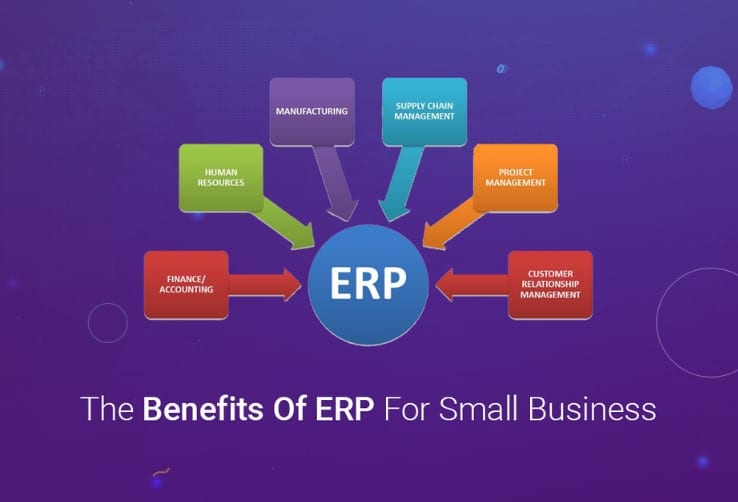In the dynamic landscape of modern business, Small and Medium Enterprises (SMEs) are increasingly turning to Enterprise Resource Planning (ERP) systems to stay competitive and agile. In this article, we’ll delve into the intricacies of ERP for small businesses, exploring the benefits, challenges, and crucial considerations in adopting and implementing such systems.
Introduction to ERP

Definition and Purpose
ERP, an acronym for Enterprise Resource Planning, is a software solution designed to integrate and manage various business processes and functions within an organization. Its primary goal is to enhance efficiency, optimize resource utilization, and provide a comprehensive view of business operations.
Evolution and Relevance in Business
Originally developed to cater to the needs of large enterprises, ERP systems have evolved to become more accessible and adaptable for small businesses. The relevance of ERP lies in its ability to provide a centralized platform that connects different departments and facilitates seamless information flow.
Benefits of ERP for Small Businesses
Efficiency and Streamlined Processes
One of the key advantages of ERP for small businesses is the ability to streamline processes. By centralizing data and automating routine tasks, businesses can eliminate redundancies and enhance overall operational efficiency.
Cost Savings and Resource Optimization
ERP systems contribute to cost savings by reducing manual efforts, minimizing errors, and optimizing resource allocation. Small businesses can benefit from improved financial management, procurement processes, and inventory control, leading to long-term cost-effectiveness.
Challenges of Implementing ERP in Small Businesses
Budget Constraints
While the benefits of ERP are clear, small businesses often face budgetary constraints that hinder the adoption of such systems. Overcoming these limitations requires careful planning and consideration of cost-effective solutions.
Resistance to Change
Implementing ERP necessitates a cultural shift within the organization. Resistance to change from employees accustomed to existing processes can pose a significant challenge. Effective change management strategies are crucial to overcoming this obstacle.
Choosing the Right ERP System
Tailoring Solutions to Specific Needs
Small businesses should opt for ERP solutions that align with their specific needs. Customization is key, ensuring that the system caters to the unique requirements of the business without unnecessary complexities.
Scalability for Future Growth
Selecting an ERP system with scalability in mind is essential for small businesses looking to expand. The chosen system should accommodate growth without compromising performance or requiring a complete overhaul.
Integration with Existing Systems
Seamless Data Transfer
Integration with existing systems is a critical aspect of ERP implementation. The transition should be smooth, with minimal disruption to daily operations. Ensuring seamless data transfer between old and new systems is paramount.
Minimizing Disruptions During Implementation
ERP implementation can temporarily disrupt normal business operations. Minimizing these disruptions requires careful planning, thorough testing, and a phased approach to implementation that allows for gradual adjustments.
Training and Change Management
Ensuring User Adoption
Training employees to use the new ERP system is crucial for its successful implementation. Ensuring user adoption through comprehensive training programs helps employees embrace the change and use the system effectively.
Overcoming Employee Resistance
Resistance to change is a common challenge during ERP implementation. Communicating the benefits, involving employees in the process, and addressing concerns proactively are essential steps in overcoming resistance.
Security and Data Privacy
Importance of Safeguarding Business Data
With the increasing threat of cyber-attacks, safeguarding business data is a top priority. ERP systems must have robust security measures in place to protect sensitive information and ensure compliance with data protection regulations.
Compliance with Industry Standards
Adherence to industry standards and regulations is non-negotiable when it comes to ERP systems. Small businesses must choose ERP solutions that prioritize data privacy and comply with relevant industry standards.
Case Studies: Successful ERP Implementation in Small Businesses
Drawing insights from real-world examples can provide valuable lessons for small businesses considering ERP adoption. Case studies highlighting successful ERP implementations showcase the positive impact on efficiency, cost savings, and overall business growth.
Real-World Examples of Positive Outcomes
- XYZ Manufacturing: Implemented ERP to streamline production processes, resulting in a 20% increase in efficiency.
- ABC Retail: Improved inventory management and order fulfillment, leading to a 15% reduction in operational costs.
Lessons Learned and Best Practices
Learning from the experiences of other small businesses can guide effective ERP implementation. Emphasizing the importance of thorough planning, employee involvement, and continuous monitoring contributes to long-term success.
Common Misconceptions about ERP for Small Businesses
Addressing Myths and Misconceptions
Dispelling common misconceptions about ERP is crucial for informed decision-making. Addressing concerns related to cost, complexity, and adaptability helps small businesses make well-informed choices.
Clarifying the Potential Impact on Operations
Misconceptions often stem from a lack of understanding. Clarifying how ERP can positively impact daily operations, enhance productivity, and contribute to business growth can dispel doubts and encourage adoption.
Future Trends in ERP for Small Businesses
Cloud-Based Solutions
The future of ERP for small businesses lies in cloud-based solutions. Cloud ERP offers flexibility, scalability, and accessibility, allowing businesses to adapt to changing needs seamlessly.
AI and Automation Integration
Integrating Artificial Intelligence (AI) and automation into ERP systems is a growing trend. Predictive analytics, machine learning, and robotic process automation enhance decision-making and streamline operations.
Conclusion
In conclusion, the adoption of ERP for small businesses is a strategic move towards enhancing operational efficiency, reducing costs, and positioning for future growth. While challenges exist, careful planning, employee engagement, and adherence to best practices can lead to successful implementation.